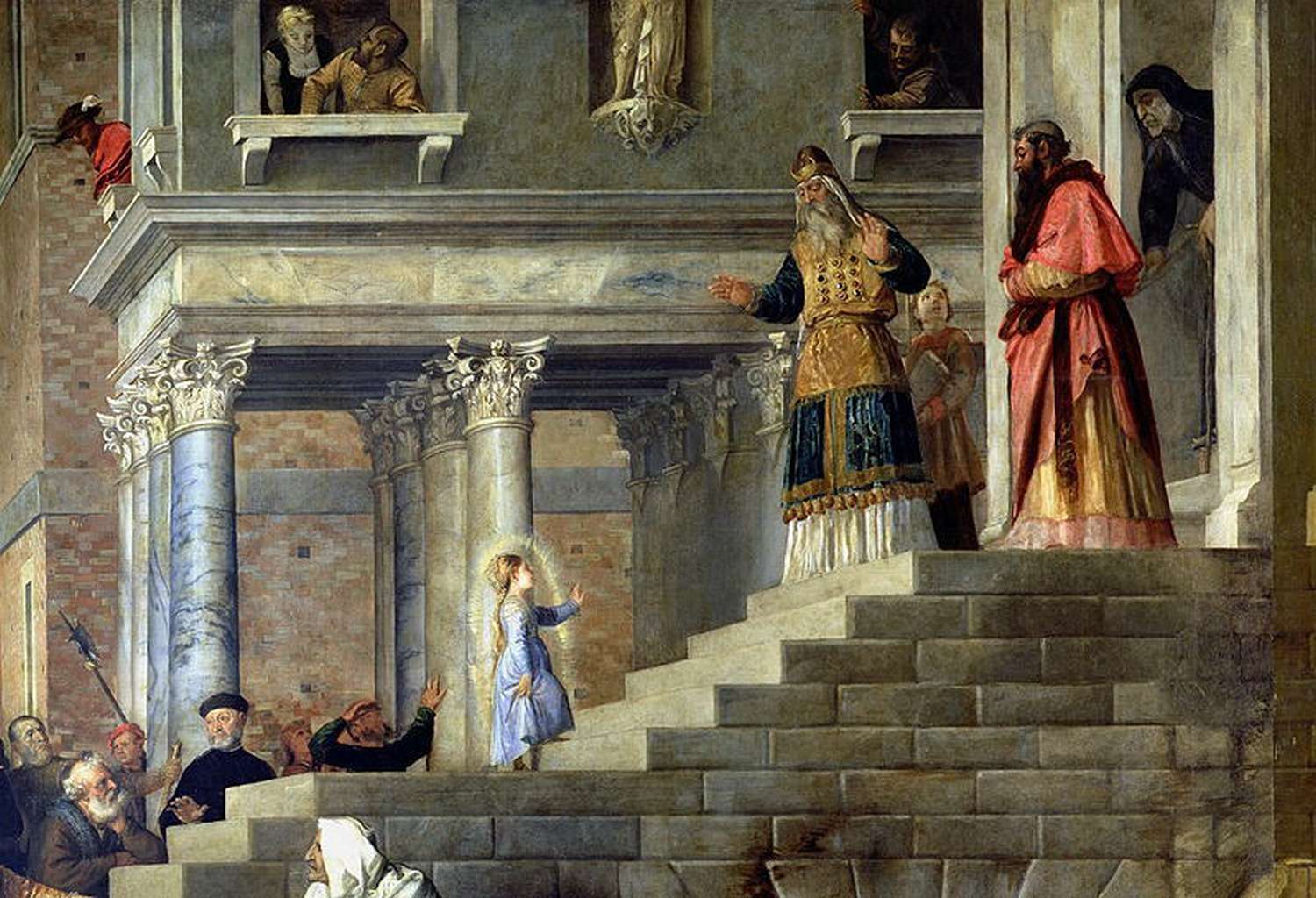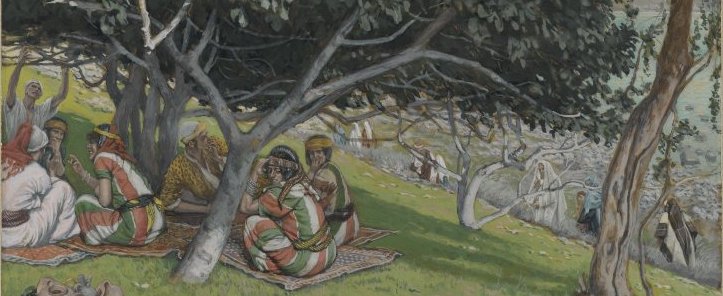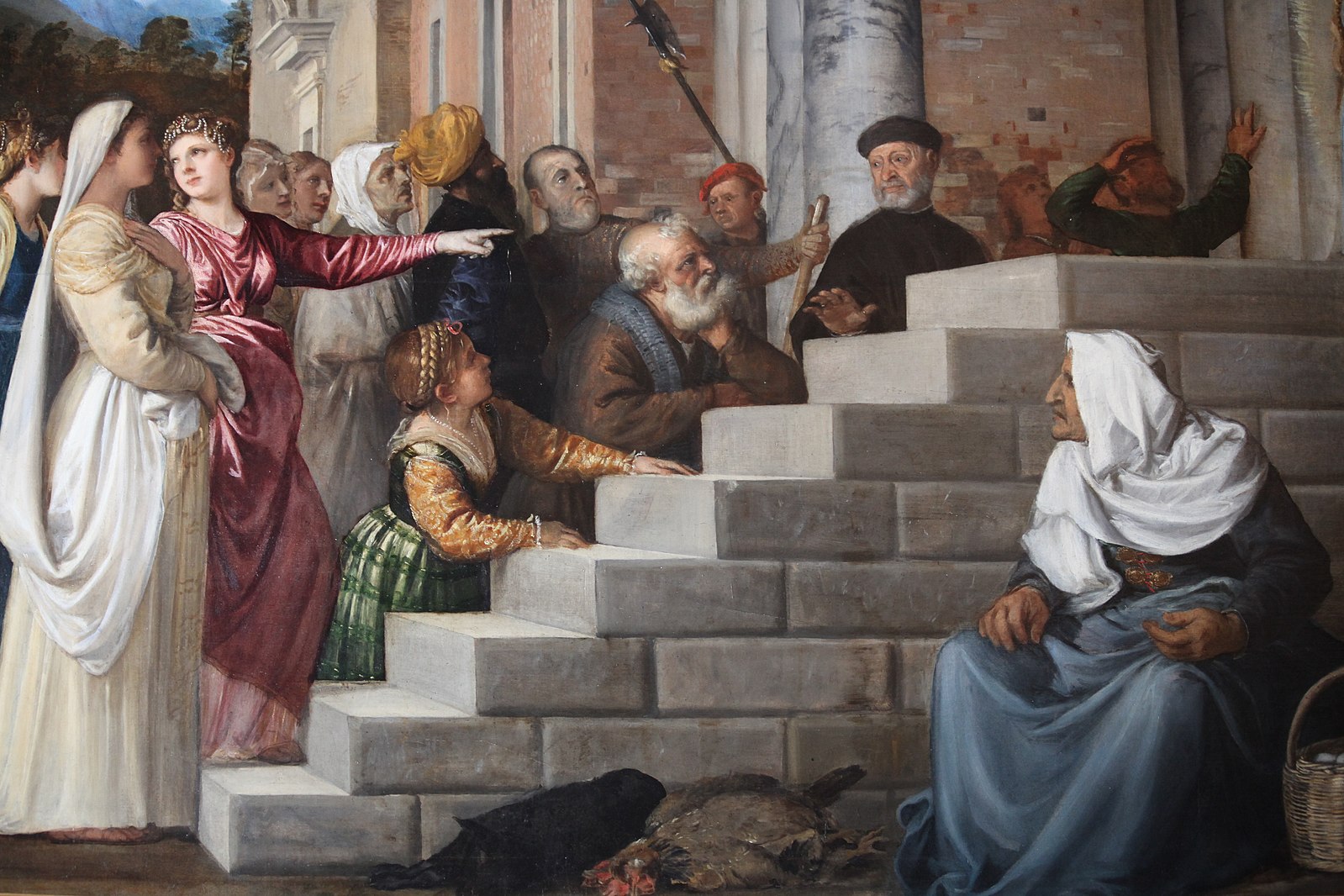


Today we celebrate one of the principal feasts of Holy Orthodoxy: the Entry of the Most Holy Theotokos into the Temple. It is a momentous feast, observing the end of a whole life-world. Let us briefly sketch out some of the historical background to understand it better.
In the sixth century B.C. the Persians were the most powerful force on earth subjugating the Babylonians along with their vassal peoples. They believed that the favor of their god, to whom they offered blood sacrifice, lay behind their ascendancy. They saw themselves as god's agents on earth assuring the well-being of his life-world.
In Jerusalem the Persians ordered a Temple be built on Mt. Zion which would house the administrative center of their province Judah: collecting taxes, administering laws, convening tribunals, and ensuring the continuity of orderly worship, and, of course, feeding their god's insatiable thirst for blood. For these things were the first duties of the Persian emperor.
Writes Prof. Yihai Kiel of the Hebrew University in Jerusalem,
|
A close examination of the different functions of the king according to the Old Persian
inscriptions [were] first and foremost, sacrifice to Ahura Mazda and the preservation
of the cosmic and political Order ....
("Reinventing Mosaic Torah in Ezra-Nehemiah ...." Journal of Biblical Literature No.2, 2017) |
This, of course, is exactly what we find in Deuteronomy and Leviticus: two books reflecting the Persian Scriptures with their attention to diet, personal hygiene, and acceptable social conduct. And Babylon's Code of Hammurabi (1772 B.C.) predates Moses by two centuries (according to the Rabbinical record) The Mesopotamian Code of Ur-Nammu (2050 B.C.) is earlier still.
In Judah, there would be no angels ascending and descending upon the sons and daughters of man (Jn 1:25). These were expressions of the religion of the Patriarchs to be suppressed even until the time of Jesus. Sadducees prohibited talk of angels, the afterlife, and the immortality of the soul. For a conquering power must retain control at all costs. They alone must be dispensers of permission. To countenance such powers given to individuals, encountering angels who reveal a far higher authority, would have been seen as dangerous, rising to sedition. And as late as the first century A.D., the Zion Temple authorities strictly forbade such talk.
Following invasion and conquest, the task before any imperial power, in general, was to maintain civil order: centralized government, centralized taxation, and centralized control of religion. And these task were carried out by Nehemiah, the Persian governor, leaving religious control to Ezra, his scribe and priest.
Ezra's achievement can be seen in the Persian religion being cleverly grafted on to the existing Hebrew Bible. Remember, Judeans of the first century could neither read nor write (literary rate of 3%). They did not sit before their televisions and object: "What's this? A different actor playing the leading role in my favorite drama?!" Access to holy texts was mediated by religious officials. And Ezra's appropriation of those texts can be seen plainly — the last passage of 2 Chronicles is the first passage in the Book of Ezra — and not so plainly seen — with blood sacrifice being written into the narrative in many places.
Yet the intrusion of a foreign power could not finessed. After all, there all these people in charge, speaking Aramaic (the Babylonian language) and dressed in strange garments, resulting in a Levant that was balkanized into many varieties of Hebrew belief. For example, the Essenes down to the first century A.D. rejected blood sacrifice. They would go down to the Temple and set their faces prophetically against the Temple and performed an examination of conscience in a ritual way.
And one notable Teacher, the Son of God, called the whole enterprise into question, wryly mocking it in His Parable of the Good Samaritan. You will recall that the Temple priests and the Levites receive their come-uppance in this story. And, on one occasion, Jesus riotously protests in the Temple itself — overturning cages where sacrificial animals were sold, beating the men who sold them with a whip (which He made), and crying out, you shall not make my Father's house a "place of trade." We should read this phrase very carefully and not export our modern English idioms into the mix. It was an οικον εμφοριον / oikon emphorion. What was being traded? It was a vain attempt to trade blood sacrifice for salvation. And this Jesus could not tolerate.
At the arrival of these Persian agents and their ascent to power, whole migrations of Hebrew peoples began — to the south in Elephantine of Egypt where they built a Temple honoring YHWH (a Name which was not permitted to be said in Jerusalem), and to the north, in Samaria, where a Temple was built on Mt. Gerizim, also keeping the old ways, the ways of the Patriarchs.
As we have seen, in the era just preceding Jesus' birth, the the rulers of Judah, the Maccabees, had taken this Persian hybrid religion, which they called Judah-ism, to a new level insisting that all Hebrews be conformed to it.
But let us turn away from the society at-large and focus on the disciples of Jesus in a personal way. After all, they were not from Judah. They were from the historical Northern Kingdom, away from hated Jerusalem. Jerusalem was the last place they wanted to go!
Now tell me, what would your prayer-life be without a Father in Heaven? When I pray to God, I unfailingly say, "Gracious Lord, Almighty God and Father ....." If I could not, my experience would be very different.
What would your journey toward holiness be without a Holy Spirit? Can you imagine it? We see a world around us alive with His Presence.
And what would your conception of life be without a Kingdom of Heaven? What would it be to have the Bosom of Abraham taken from you? And at the beginning of Jesus' ministry, these were the things He proclaimed. (The end of the first chapter of St. John's Gospel.) That is, Jesus announced a restoration of the old ways — a restoration of the Hebrew life-world and intimacy with God. Not the distant god worshiped in the Zion Temple, but intimacy. More than any other thing, that is what this feast is all about.
If we were asked to single out one thing that prompted God to be born into the world when He was born into the world, what would it be? The Roman Empire represented no threat to God's people. Said Jesus, "Render unto Caesar what is Caesar's." No, it would be that hateful house of blood that sought to subjugate the hearts and souls and minds of the historical Hebrew people with the absurd offering of dead goats as a substitute for genuine spiritual life. The whole concept was mocked by God in the Psalms:
| Do you imagine that I relish drinking the blood of dead goats?! (Ps 49:13) |
It was mocked by the Father, and it will be mocked by the Son.
As Jesus confided to St. Photini, the woman at the well,
|
But the hour is coming, and now is, when the true worshipers will worship
the Father in spirit and truth; for the Father is seeking such to worship Him. (Jn 4:23) |
.... and this said virtually in shadow the ruin of the Mt. Gerizim Temple. Let us pause to note that this is same teaching Jesus communicates to Martha. I paraphrase: "Emulate your sister Mary," He tell her. "For she has already as a "true worshiper." (i.e., sitting at Jesus' knee). Here is intimacy with God. Isn't this the whole goal of theosis?
And what would be Martha's nominal mode of worship, which Jesus would deem "false worship"? Well, Martha (together with Mary and Lazarus) are not from the historical Northern Kingdom as Jesus' disciples are. They are from Bethany in Judah. Since the invasion of the Persians and certainly with the rise of the Hasmoneans, the "spirituality" (if we can call it that) of their region would have centered on the Zion Temple. You see Martha's was checklist religion. Buy a dove to be sacrifice and you're all done.
The Temple with its heavy-handed authorities; the Temple with its brutal police; the Temple with its web of synagogues brainwashing the people, the Temple with its army of priests and Levites dragging bellowing animals to the altar, hanging their carcasses on the horns of the Altar. "I will destroy this Temple!," Jesus said.
After the long, bitter, lifeless winter .... the sky is gray, the earth is hard, a winter which never ends, a little, delicate blossom is seen forcing itself up between the enormous stones of the Temple. A breath of fragrant, warm air is detected. These are the first intimations of spring. The ice begins to crack. The sound of dripping water is heard .... everywhere. And the centuries-old oppression begins to fall, rotting from within.
For a tender Virgin, little more than a toddler, enters the Temple. Her pristine feet are set upon the Temple's heavy steps. Her little frame proceeds past its massive columns and stones. Her innocent soul ascends toward the slaughterhouse. For she — this powerless, diminutive girl — will be the replacement for this colossal fortress. She will be the place by the grace of God, in Whom the vastness of the cosmos and beyond will dwell.
She will be the new and definitive Holy of the Holies. For in the First Temple, far from being a bloodbath of terrorized animals, the High Priest attained the furthest reach of theosis, which was perfect spiritual union with God.
Can we conceive of something above and beyond this perfection? This Virgin's body in every fiber of her being will participate with the heartbeat of God — her every cell, her blood, her bone will be intermixed with God's. Talk about union with the Divine! For a time she will be indistinguishable from God Who grows inside her. And God will proceed out of her, offering divine union to all people. Astonishing!
No one is permitted in the Temple itself except a priest or Levite. Only the high priest might enter the Holy of Holies .... and then once a year. God proceeds from the Sanctum of the Holy Virgin to offer divine union with all people .... to the furthest corners of the earth (He says)!

The Temple's immense stones,
designed to impress a fearful people,
now introduce into itself One Whose lightness of being is
nearly angelic.
The Temple stinking of animal blood that cannot be washed
from its porous stones
with its
lightless corridors,
yet
Her life from its conception and birth is one of Divine cooperation,
filled with celestial atmosphere,
and
shedding a kindly radiance upon all.
She is filled with Light of the World.
Reflecting on the Temple .... it is not very different from tombs of Gad to which a demoniac was chained. The people languish is trance. They understand that somehow YHWH is worshiped here. A lie! An engineered and carefully executed lie! They are chained to a tomb and possessed by legions of demons who have gathered in unimaginable numbers.
Yet Her luminous form ascends the broad steps of the Temple barely touching the ground. She is immune from its deathly vapors. And the trajectory of Her life her life will be taken in every direction Nazareth, Egypt, Bethlehem, Jerusalem, Ephesus .... God's Everywhere, which is the Kingdom of Heaven.
Her presence begins to break the spell of Temple worship. For "God has chosen the .... the weak .... to confound .... the mighty" (1 Cor 1:27). And in her simple unknowing, Holy Mary has comprehended, mysteriously, the incommensurable greatness of God. Her simple unknowing .... she did not understand so much.
As we continue our fast, emptying our minds before Her sublime humility, divine revelation floods into our souls and understanding:
The True Holy of Holies is brought to dwell near the false Holy of Holies.
The Eternal and Life-giving Sanctuary stands as witness to this near criminal scene of carnal blood.
Her Ever-Virginal wholeness is brought near to the Temple's (and everlasting) disintegration and destruction.
The perfectly Dwelling-place of God is brought near to the place where God has been rejected.
The holy dimensions of this moment are scarcely to be grasped. Let us turn to the words of St. Philaret, Patriarch of Moscow:
| During the days of the Creation ...., when God uttered His .... mighty words: "Let there be," the Creator's words brought creatures into existence. But on the day, unique in the existence of the world, when Holy Mary uttered her humble and obedient "Let it be," I would hardly dare to express what took place then — the word of the creature caused the Creator to descend into the world. God uttered His word here also: You "will conceive in your womb and bear a son .... He will be great .... and He will reign over the house of Jacob for ever." But again that which is divine and incomprehensible occurs — the Word of God itself defers its action, allowing itself to be delayed by the word of Mary: How can this be? Her humble "Let it be" was necessary for the realization of God's mighty "Let it be." What secret power is thus contained in these simple words: "Behold, I am the handmaid of the Lord; let it be to me according to your will" — that it produces an effect so extraordinary? This marvelous power is Mary's pure and perfect self-dedication to God, a dedication of her will, of her thought, of her soul, of her entire being, of all her faculties, of all her actions, of all her hopes and expectations. (Choix de Sermons, Paris, 1866, T.1, 187) |
Let us also, who follow the path of fasting and self-denial,
utter those mysterious words of power:
"Be it unto me according to Your will ..."
Let God take over your life.
(You weren't really doing anything anyway!)
Let Him make every dimension of your heart and soul and body
His dwelling place.
He has so much to do!
And He longs for faithful men and faithful women to
decide in their freedom to become His holy instruments.
In the Name of the Father and of the Son and of the Holy Ghost. Amen.